Entrepreneurship and Small Business: UK Opportunities Post-Brexit
VerifiedAdded on 2023/03/24
|15
|4707
|56
Report
AI Summary
This report provides an analysis of entrepreneurship and small business ventures in the UK, focusing on the impact of Brexit on the social economy. It examines different types of entrepreneurial ventures, including small-scale, large-scale, social, and scalable entrepreneurship, highlighting their similarities and differences. The report assesses the influence of micro and small business enterprises on the social economy after Brexit, emphasizing their significance in employment, competitiveness, and overall economic growth. It also discusses the importance of creativity and innovation in driving business success and explores the characteristics and motivations of successful entrepreneurs, considering the influence of their background and experience. The document is available on Desklib, a platform offering study tools and resources for students.

ENTREPRENEURSHIP
AND SMALL BUSINESS
ENTERPRISE
AND SMALL BUSINESS
ENTERPRISE
Paraphrase This Document
Need a fresh take? Get an instant paraphrase of this document with our AI Paraphraser
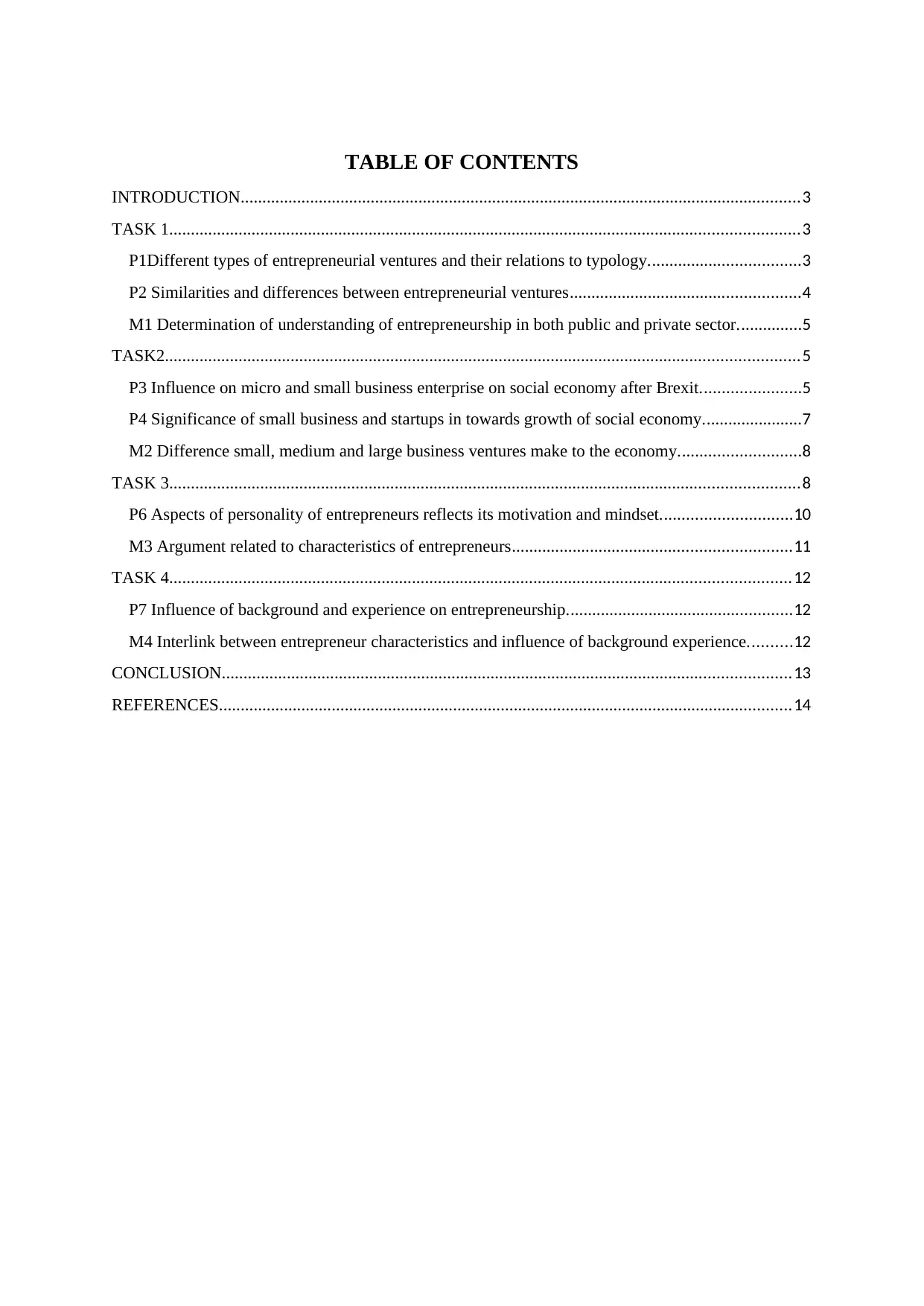
TABLE OF CONTENTS
INTRODUCTION.................................................................................................................................3
TASK 1.................................................................................................................................................3
P1Different types of entrepreneurial ventures and their relations to typology...................................3
P2 Similarities and differences between entrepreneurial ventures.....................................................4
M1 Determination of understanding of entrepreneurship in both public and private sector...............5
TASK2..................................................................................................................................................5
P3 Influence on micro and small business enterprise on social economy after Brexit.......................5
P4 Significance of small business and startups in towards growth of social economy.......................7
M2 Difference small, medium and large business ventures make to the economy............................8
TASK 3.................................................................................................................................................8
P6 Aspects of personality of entrepreneurs reflects its motivation and mindset..............................10
M3 Argument related to characteristics of entrepreneurs................................................................11
TASK 4...............................................................................................................................................12
P7 Influence of background and experience on entrepreneurship....................................................12
M4 Interlink between entrepreneur characteristics and influence of background experience..........12
CONCLUSION...................................................................................................................................13
REFERENCES....................................................................................................................................14
INTRODUCTION.................................................................................................................................3
TASK 1.................................................................................................................................................3
P1Different types of entrepreneurial ventures and their relations to typology...................................3
P2 Similarities and differences between entrepreneurial ventures.....................................................4
M1 Determination of understanding of entrepreneurship in both public and private sector...............5
TASK2..................................................................................................................................................5
P3 Influence on micro and small business enterprise on social economy after Brexit.......................5
P4 Significance of small business and startups in towards growth of social economy.......................7
M2 Difference small, medium and large business ventures make to the economy............................8
TASK 3.................................................................................................................................................8
P6 Aspects of personality of entrepreneurs reflects its motivation and mindset..............................10
M3 Argument related to characteristics of entrepreneurs................................................................11
TASK 4...............................................................................................................................................12
P7 Influence of background and experience on entrepreneurship....................................................12
M4 Interlink between entrepreneur characteristics and influence of background experience..........12
CONCLUSION...................................................................................................................................13
REFERENCES....................................................................................................................................14
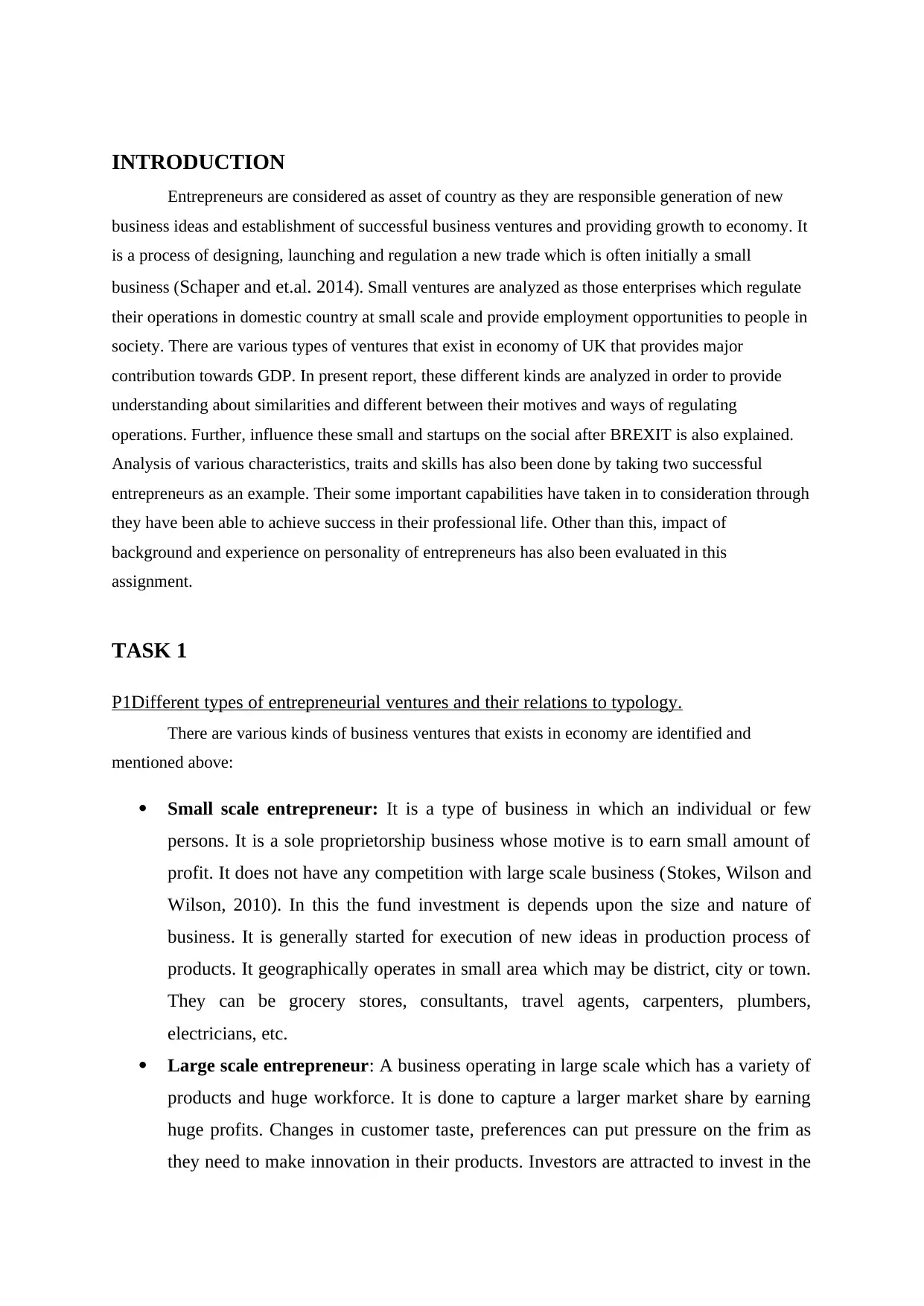
INTRODUCTION
Entrepreneurs are considered as asset of country as they are responsible generation of new
business ideas and establishment of successful business ventures and providing growth to economy. It
is a process of designing, launching and regulation a new trade which is often initially a small
business (Schaper and et.al. 2014). Small ventures are analyzed as those enterprises which regulate
their operations in domestic country at small scale and provide employment opportunities to people in
society. There are various types of ventures that exist in economy of UK that provides major
contribution towards GDP. In present report, these different kinds are analyzed in order to provide
understanding about similarities and different between their motives and ways of regulating
operations. Further, influence these small and startups on the social after BREXIT is also explained.
Analysis of various characteristics, traits and skills has also been done by taking two successful
entrepreneurs as an example. Their some important capabilities have taken in to consideration through
they have been able to achieve success in their professional life. Other than this, impact of
background and experience on personality of entrepreneurs has also been evaluated in this
assignment.
TASK 1
P1Different types of entrepreneurial ventures and their relations to typology.
There are various kinds of business ventures that exists in economy are identified and
mentioned above:
Small scale entrepreneur: It is a type of business in which an individual or few
persons. It is a sole proprietorship business whose motive is to earn small amount of
profit. It does not have any competition with large scale business (Stokes, Wilson and
Wilson, 2010). In this the fund investment is depends upon the size and nature of
business. It is generally started for execution of new ideas in production process of
products. It geographically operates in small area which may be district, city or town.
They can be grocery stores, consultants, travel agents, carpenters, plumbers,
electricians, etc.
Large scale entrepreneur: A business operating in large scale which has a variety of
products and huge workforce. It is done to capture a larger market share by earning
huge profits. Changes in customer taste, preferences can put pressure on the frim as
they need to make innovation in their products. Investors are attracted to invest in the
Entrepreneurs are considered as asset of country as they are responsible generation of new
business ideas and establishment of successful business ventures and providing growth to economy. It
is a process of designing, launching and regulation a new trade which is often initially a small
business (Schaper and et.al. 2014). Small ventures are analyzed as those enterprises which regulate
their operations in domestic country at small scale and provide employment opportunities to people in
society. There are various types of ventures that exist in economy of UK that provides major
contribution towards GDP. In present report, these different kinds are analyzed in order to provide
understanding about similarities and different between their motives and ways of regulating
operations. Further, influence these small and startups on the social after BREXIT is also explained.
Analysis of various characteristics, traits and skills has also been done by taking two successful
entrepreneurs as an example. Their some important capabilities have taken in to consideration through
they have been able to achieve success in their professional life. Other than this, impact of
background and experience on personality of entrepreneurs has also been evaluated in this
assignment.
TASK 1
P1Different types of entrepreneurial ventures and their relations to typology.
There are various kinds of business ventures that exists in economy are identified and
mentioned above:
Small scale entrepreneur: It is a type of business in which an individual or few
persons. It is a sole proprietorship business whose motive is to earn small amount of
profit. It does not have any competition with large scale business (Stokes, Wilson and
Wilson, 2010). In this the fund investment is depends upon the size and nature of
business. It is generally started for execution of new ideas in production process of
products. It geographically operates in small area which may be district, city or town.
They can be grocery stores, consultants, travel agents, carpenters, plumbers,
electricians, etc.
Large scale entrepreneur: A business operating in large scale which has a variety of
products and huge workforce. It is done to capture a larger market share by earning
huge profits. Changes in customer taste, preferences can put pressure on the frim as
they need to make innovation in their products. Investors are attracted to invest in the
⊘ This is a preview!⊘
Do you want full access?
Subscribe today to unlock all pages.

Trusted by 1+ million students worldwide
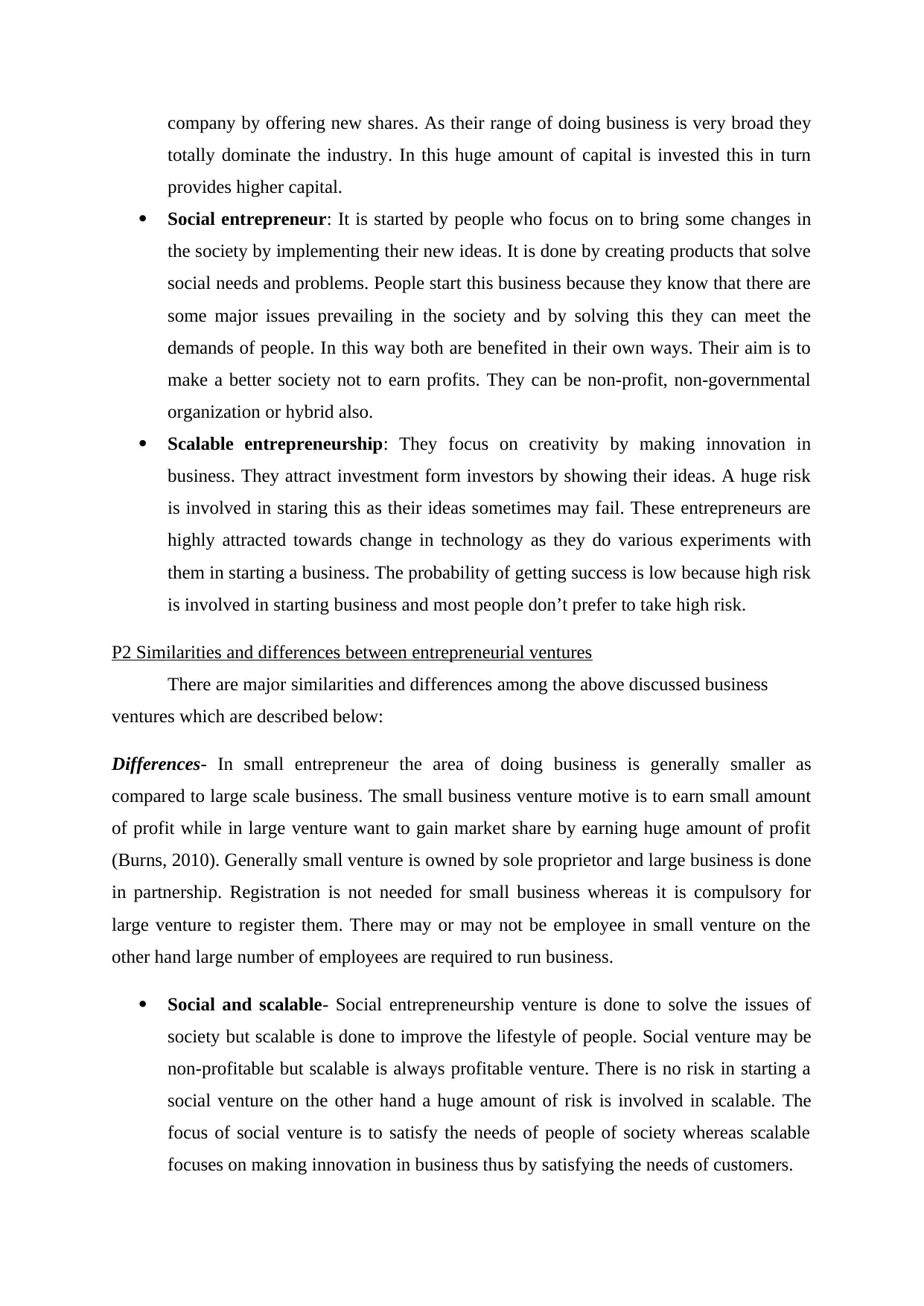
company by offering new shares. As their range of doing business is very broad they
totally dominate the industry. In this huge amount of capital is invested this in turn
provides higher capital.
Social entrepreneur: It is started by people who focus on to bring some changes in
the society by implementing their new ideas. It is done by creating products that solve
social needs and problems. People start this business because they know that there are
some major issues prevailing in the society and by solving this they can meet the
demands of people. In this way both are benefited in their own ways. Their aim is to
make a better society not to earn profits. They can be non-profit, non-governmental
organization or hybrid also.
Scalable entrepreneurship: They focus on creativity by making innovation in
business. They attract investment form investors by showing their ideas. A huge risk
is involved in staring this as their ideas sometimes may fail. These entrepreneurs are
highly attracted towards change in technology as they do various experiments with
them in starting a business. The probability of getting success is low because high risk
is involved in starting business and most people don’t prefer to take high risk.
P2 Similarities and differences between entrepreneurial ventures
There are major similarities and differences among the above discussed business
ventures which are described below:
Differences- In small entrepreneur the area of doing business is generally smaller as
compared to large scale business. The small business venture motive is to earn small amount
of profit while in large venture want to gain market share by earning huge amount of profit
(Burns, 2010). Generally small venture is owned by sole proprietor and large business is done
in partnership. Registration is not needed for small business whereas it is compulsory for
large venture to register them. There may or may not be employee in small venture on the
other hand large number of employees are required to run business.
Social and scalable- Social entrepreneurship venture is done to solve the issues of
society but scalable is done to improve the lifestyle of people. Social venture may be
non-profitable but scalable is always profitable venture. There is no risk in starting a
social venture on the other hand a huge amount of risk is involved in scalable. The
focus of social venture is to satisfy the needs of people of society whereas scalable
focuses on making innovation in business thus by satisfying the needs of customers.
totally dominate the industry. In this huge amount of capital is invested this in turn
provides higher capital.
Social entrepreneur: It is started by people who focus on to bring some changes in
the society by implementing their new ideas. It is done by creating products that solve
social needs and problems. People start this business because they know that there are
some major issues prevailing in the society and by solving this they can meet the
demands of people. In this way both are benefited in their own ways. Their aim is to
make a better society not to earn profits. They can be non-profit, non-governmental
organization or hybrid also.
Scalable entrepreneurship: They focus on creativity by making innovation in
business. They attract investment form investors by showing their ideas. A huge risk
is involved in staring this as their ideas sometimes may fail. These entrepreneurs are
highly attracted towards change in technology as they do various experiments with
them in starting a business. The probability of getting success is low because high risk
is involved in starting business and most people don’t prefer to take high risk.
P2 Similarities and differences between entrepreneurial ventures
There are major similarities and differences among the above discussed business
ventures which are described below:
Differences- In small entrepreneur the area of doing business is generally smaller as
compared to large scale business. The small business venture motive is to earn small amount
of profit while in large venture want to gain market share by earning huge amount of profit
(Burns, 2010). Generally small venture is owned by sole proprietor and large business is done
in partnership. Registration is not needed for small business whereas it is compulsory for
large venture to register them. There may or may not be employee in small venture on the
other hand large number of employees are required to run business.
Social and scalable- Social entrepreneurship venture is done to solve the issues of
society but scalable is done to improve the lifestyle of people. Social venture may be
non-profitable but scalable is always profitable venture. There is no risk in starting a
social venture on the other hand a huge amount of risk is involved in scalable. The
focus of social venture is to satisfy the needs of people of society whereas scalable
focuses on making innovation in business thus by satisfying the needs of customers.
Paraphrase This Document
Need a fresh take? Get an instant paraphrase of this document with our AI Paraphraser
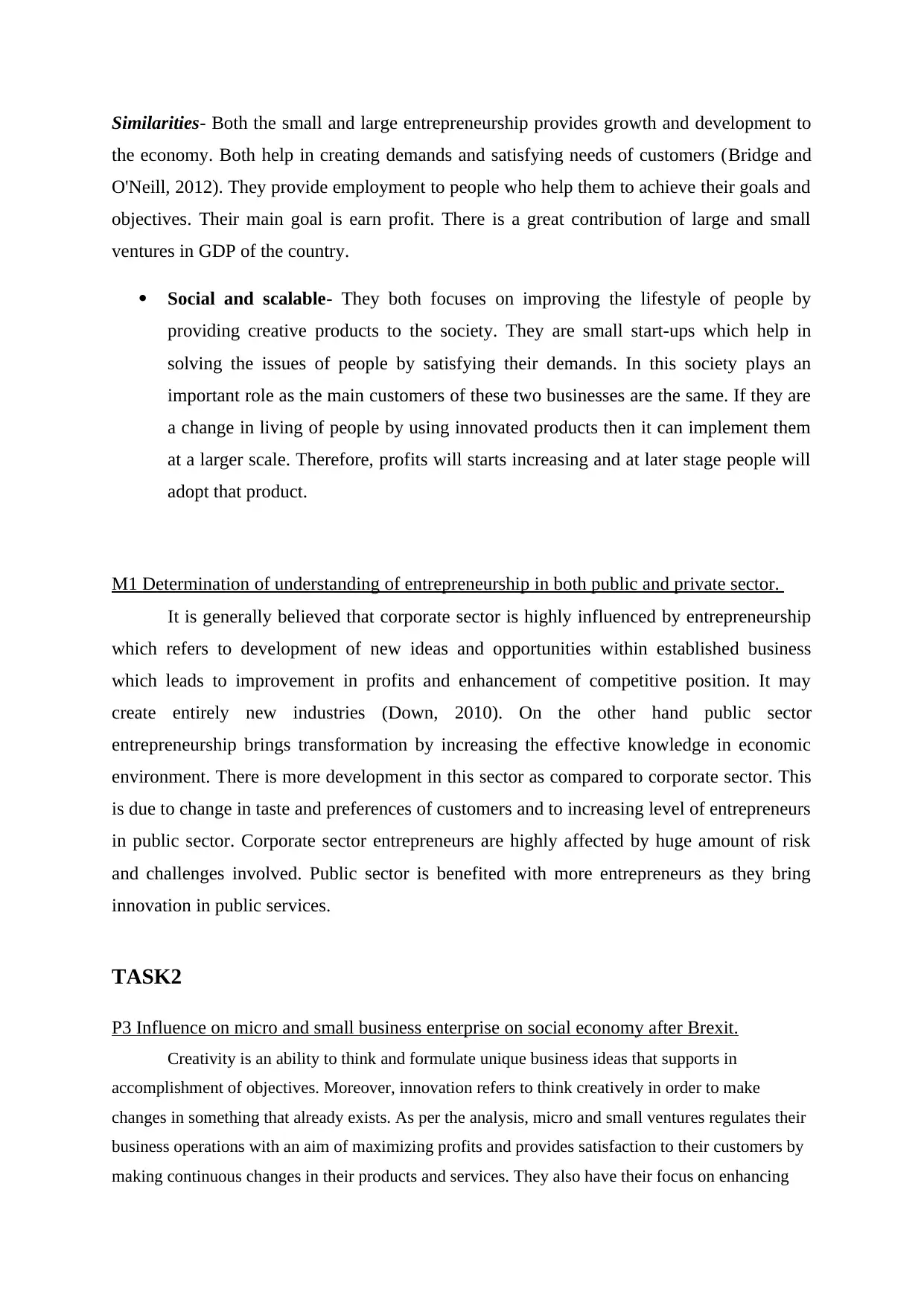
Similarities- Both the small and large entrepreneurship provides growth and development to
the economy. Both help in creating demands and satisfying needs of customers (Bridge and
O'Neill, 2012). They provide employment to people who help them to achieve their goals and
objectives. Their main goal is earn profit. There is a great contribution of large and small
ventures in GDP of the country.
Social and scalable- They both focuses on improving the lifestyle of people by
providing creative products to the society. They are small start-ups which help in
solving the issues of people by satisfying their demands. In this society plays an
important role as the main customers of these two businesses are the same. If they are
a change in living of people by using innovated products then it can implement them
at a larger scale. Therefore, profits will starts increasing and at later stage people will
adopt that product.
M1 Determination of understanding of entrepreneurship in both public and private sector.
It is generally believed that corporate sector is highly influenced by entrepreneurship
which refers to development of new ideas and opportunities within established business
which leads to improvement in profits and enhancement of competitive position. It may
create entirely new industries (Down, 2010). On the other hand public sector
entrepreneurship brings transformation by increasing the effective knowledge in economic
environment. There is more development in this sector as compared to corporate sector. This
is due to change in taste and preferences of customers and to increasing level of entrepreneurs
in public sector. Corporate sector entrepreneurs are highly affected by huge amount of risk
and challenges involved. Public sector is benefited with more entrepreneurs as they bring
innovation in public services.
TASK2
P3 Influence on micro and small business enterprise on social economy after Brexit.
Creativity is an ability to think and formulate unique business ideas that supports in
accomplishment of objectives. Moreover, innovation refers to think creatively in order to make
changes in something that already exists. As per the analysis, micro and small ventures regulates their
business operations with an aim of maximizing profits and provides satisfaction to their customers by
making continuous changes in their products and services. They also have their focus on enhancing
the economy. Both help in creating demands and satisfying needs of customers (Bridge and
O'Neill, 2012). They provide employment to people who help them to achieve their goals and
objectives. Their main goal is earn profit. There is a great contribution of large and small
ventures in GDP of the country.
Social and scalable- They both focuses on improving the lifestyle of people by
providing creative products to the society. They are small start-ups which help in
solving the issues of people by satisfying their demands. In this society plays an
important role as the main customers of these two businesses are the same. If they are
a change in living of people by using innovated products then it can implement them
at a larger scale. Therefore, profits will starts increasing and at later stage people will
adopt that product.
M1 Determination of understanding of entrepreneurship in both public and private sector.
It is generally believed that corporate sector is highly influenced by entrepreneurship
which refers to development of new ideas and opportunities within established business
which leads to improvement in profits and enhancement of competitive position. It may
create entirely new industries (Down, 2010). On the other hand public sector
entrepreneurship brings transformation by increasing the effective knowledge in economic
environment. There is more development in this sector as compared to corporate sector. This
is due to change in taste and preferences of customers and to increasing level of entrepreneurs
in public sector. Corporate sector entrepreneurs are highly affected by huge amount of risk
and challenges involved. Public sector is benefited with more entrepreneurs as they bring
innovation in public services.
TASK2
P3 Influence on micro and small business enterprise on social economy after Brexit.
Creativity is an ability to think and formulate unique business ideas that supports in
accomplishment of objectives. Moreover, innovation refers to think creatively in order to make
changes in something that already exists. As per the analysis, micro and small ventures regulates their
business operations with an aim of maximizing profits and provides satisfaction to their customers by
making continuous changes in their products and services. They also have their focus on enhancing
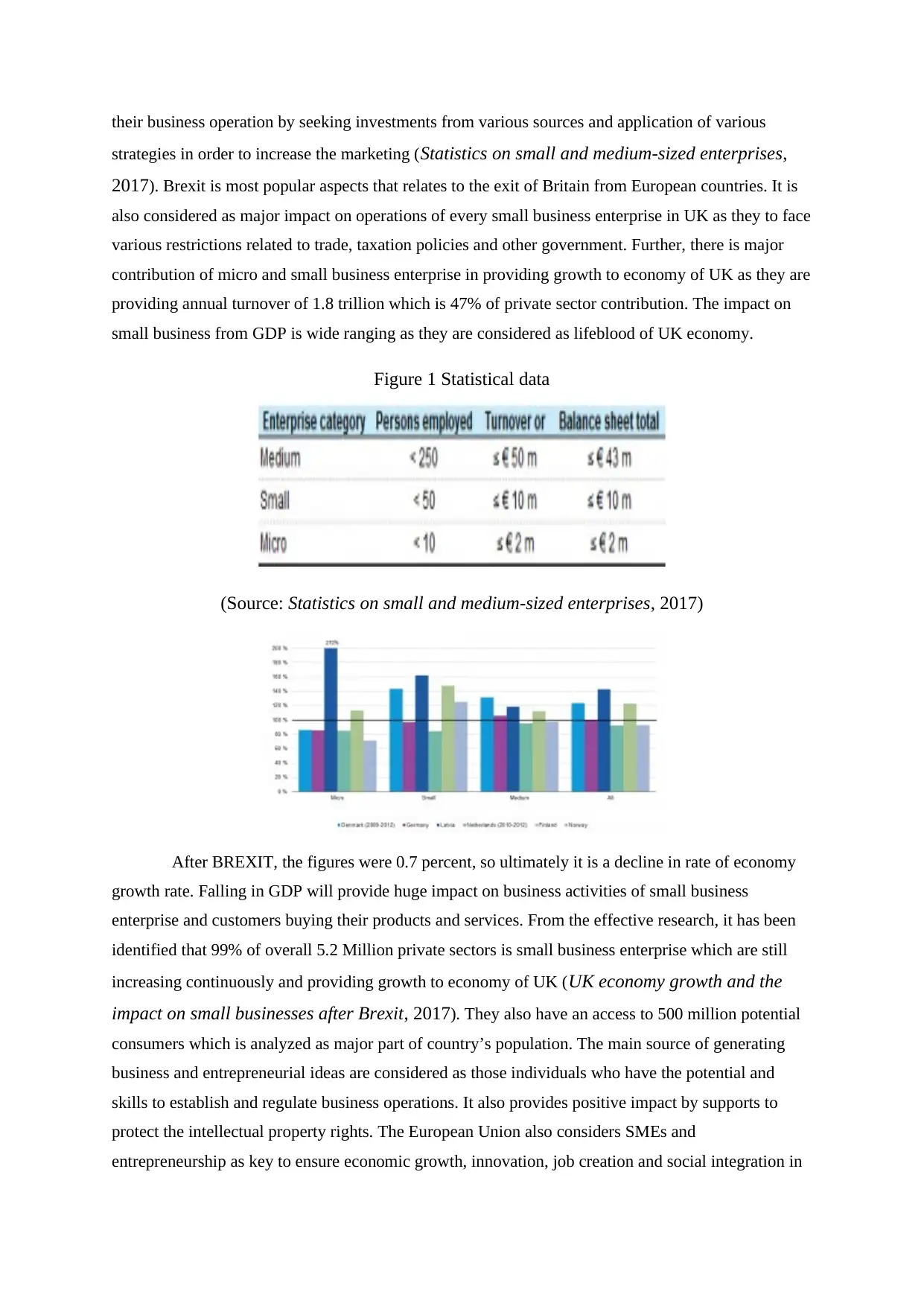
their business operation by seeking investments from various sources and application of various
strategies in order to increase the marketing (Statistics on small and medium-sized enterprises,
2017). Brexit is most popular aspects that relates to the exit of Britain from European countries. It is
also considered as major impact on operations of every small business enterprise in UK as they to face
various restrictions related to trade, taxation policies and other government. Further, there is major
contribution of micro and small business enterprise in providing growth to economy of UK as they are
providing annual turnover of 1.8 trillion which is 47% of private sector contribution. The impact on
small business from GDP is wide ranging as they are considered as lifeblood of UK economy.
Figure 1 Statistical data
(Source: Statistics on small and medium-sized enterprises, 2017)
After BREXIT, the figures were 0.7 percent, so ultimately it is a decline in rate of economy
growth rate. Falling in GDP will provide huge impact on business activities of small business
enterprise and customers buying their products and services. From the effective research, it has been
identified that 99% of overall 5.2 Million private sectors is small business enterprise which are still
increasing continuously and providing growth to economy of UK (UK economy growth and the
impact on small businesses after Brexit, 2017). They also have an access to 500 million potential
consumers which is analyzed as major part of country’s population. The main source of generating
business and entrepreneurial ideas are considered as those individuals who have the potential and
skills to establish and regulate business operations. It also provides positive impact by supports to
protect the intellectual property rights. The European Union also considers SMEs and
entrepreneurship as key to ensure economic growth, innovation, job creation and social integration in
strategies in order to increase the marketing (Statistics on small and medium-sized enterprises,
2017). Brexit is most popular aspects that relates to the exit of Britain from European countries. It is
also considered as major impact on operations of every small business enterprise in UK as they to face
various restrictions related to trade, taxation policies and other government. Further, there is major
contribution of micro and small business enterprise in providing growth to economy of UK as they are
providing annual turnover of 1.8 trillion which is 47% of private sector contribution. The impact on
small business from GDP is wide ranging as they are considered as lifeblood of UK economy.
Figure 1 Statistical data
(Source: Statistics on small and medium-sized enterprises, 2017)
After BREXIT, the figures were 0.7 percent, so ultimately it is a decline in rate of economy
growth rate. Falling in GDP will provide huge impact on business activities of small business
enterprise and customers buying their products and services. From the effective research, it has been
identified that 99% of overall 5.2 Million private sectors is small business enterprise which are still
increasing continuously and providing growth to economy of UK (UK economy growth and the
impact on small businesses after Brexit, 2017). They also have an access to 500 million potential
consumers which is analyzed as major part of country’s population. The main source of generating
business and entrepreneurial ideas are considered as those individuals who have the potential and
skills to establish and regulate business operations. It also provides positive impact by supports to
protect the intellectual property rights. The European Union also considers SMEs and
entrepreneurship as key to ensure economic growth, innovation, job creation and social integration in
⊘ This is a preview!⊘
Do you want full access?
Subscribe today to unlock all pages.

Trusted by 1+ million students worldwide
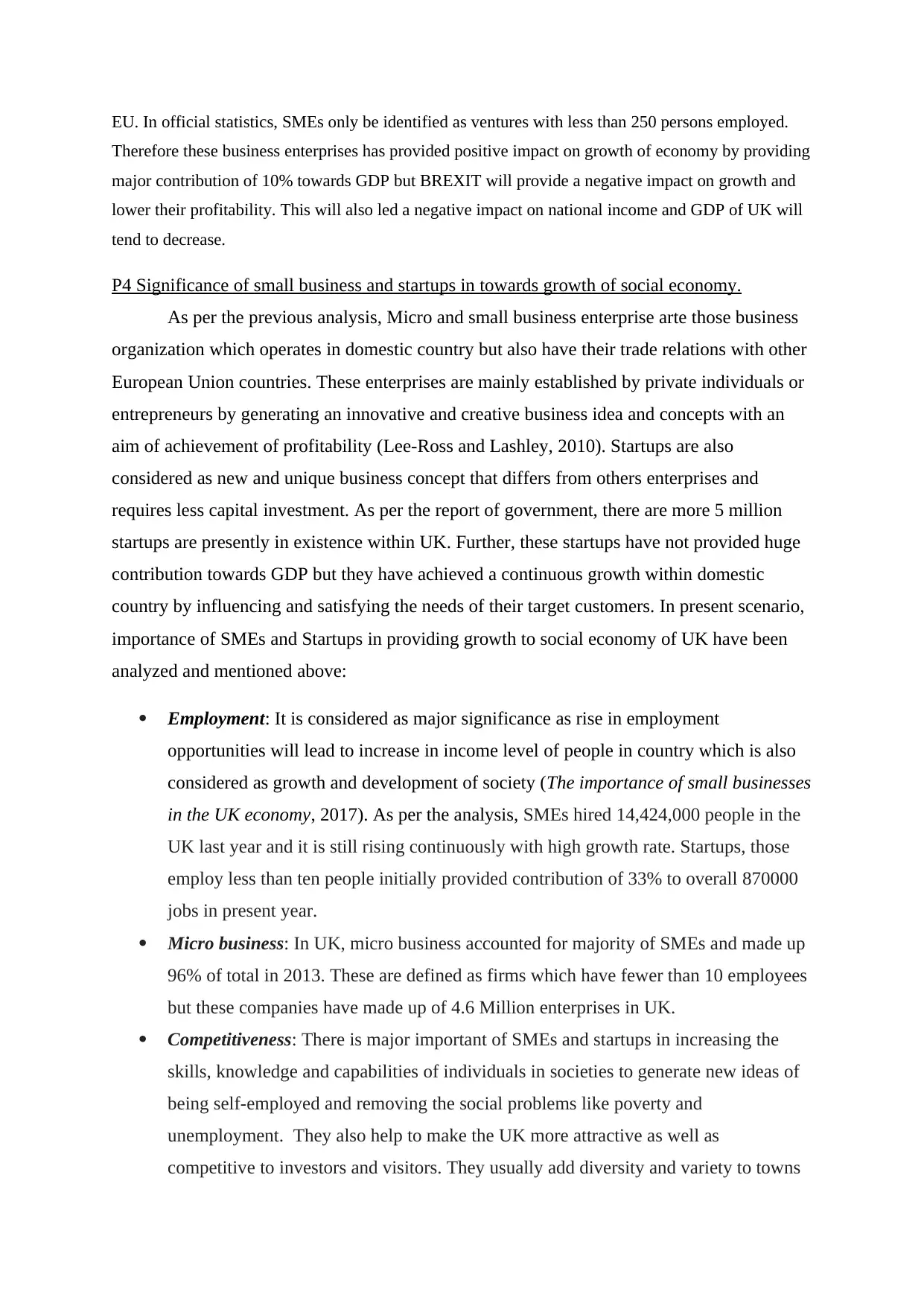
EU. In official statistics, SMEs only be identified as ventures with less than 250 persons employed.
Therefore these business enterprises has provided positive impact on growth of economy by providing
major contribution of 10% towards GDP but BREXIT will provide a negative impact on growth and
lower their profitability. This will also led a negative impact on national income and GDP of UK will
tend to decrease.
P4 Significance of small business and startups in towards growth of social economy.
As per the previous analysis, Micro and small business enterprise arte those business
organization which operates in domestic country but also have their trade relations with other
European Union countries. These enterprises are mainly established by private individuals or
entrepreneurs by generating an innovative and creative business idea and concepts with an
aim of achievement of profitability (Lee-Ross and Lashley, 2010). Startups are also
considered as new and unique business concept that differs from others enterprises and
requires less capital investment. As per the report of government, there are more 5 million
startups are presently in existence within UK. Further, these startups have not provided huge
contribution towards GDP but they have achieved a continuous growth within domestic
country by influencing and satisfying the needs of their target customers. In present scenario,
importance of SMEs and Startups in providing growth to social economy of UK have been
analyzed and mentioned above:
Employment: It is considered as major significance as rise in employment
opportunities will lead to increase in income level of people in country which is also
considered as growth and development of society (The importance of small businesses
in the UK economy, 2017). As per the analysis, SMEs hired 14,424,000 people in the
UK last year and it is still rising continuously with high growth rate. Startups, those
employ less than ten people initially provided contribution of 33% to overall 870000
jobs in present year.
Micro business: In UK, micro business accounted for majority of SMEs and made up
96% of total in 2013. These are defined as firms which have fewer than 10 employees
but these companies have made up of 4.6 Million enterprises in UK.
Competitiveness: There is major important of SMEs and startups in increasing the
skills, knowledge and capabilities of individuals in societies to generate new ideas of
being self-employed and removing the social problems like poverty and
unemployment. They also help to make the UK more attractive as well as
competitive to investors and visitors. They usually add diversity and variety to towns
Therefore these business enterprises has provided positive impact on growth of economy by providing
major contribution of 10% towards GDP but BREXIT will provide a negative impact on growth and
lower their profitability. This will also led a negative impact on national income and GDP of UK will
tend to decrease.
P4 Significance of small business and startups in towards growth of social economy.
As per the previous analysis, Micro and small business enterprise arte those business
organization which operates in domestic country but also have their trade relations with other
European Union countries. These enterprises are mainly established by private individuals or
entrepreneurs by generating an innovative and creative business idea and concepts with an
aim of achievement of profitability (Lee-Ross and Lashley, 2010). Startups are also
considered as new and unique business concept that differs from others enterprises and
requires less capital investment. As per the report of government, there are more 5 million
startups are presently in existence within UK. Further, these startups have not provided huge
contribution towards GDP but they have achieved a continuous growth within domestic
country by influencing and satisfying the needs of their target customers. In present scenario,
importance of SMEs and Startups in providing growth to social economy of UK have been
analyzed and mentioned above:
Employment: It is considered as major significance as rise in employment
opportunities will lead to increase in income level of people in country which is also
considered as growth and development of society (The importance of small businesses
in the UK economy, 2017). As per the analysis, SMEs hired 14,424,000 people in the
UK last year and it is still rising continuously with high growth rate. Startups, those
employ less than ten people initially provided contribution of 33% to overall 870000
jobs in present year.
Micro business: In UK, micro business accounted for majority of SMEs and made up
96% of total in 2013. These are defined as firms which have fewer than 10 employees
but these companies have made up of 4.6 Million enterprises in UK.
Competitiveness: There is major important of SMEs and startups in increasing the
skills, knowledge and capabilities of individuals in societies to generate new ideas of
being self-employed and removing the social problems like poverty and
unemployment. They also help to make the UK more attractive as well as
competitive to investors and visitors. They usually add diversity and variety to towns
Paraphrase This Document
Need a fresh take? Get an instant paraphrase of this document with our AI Paraphraser
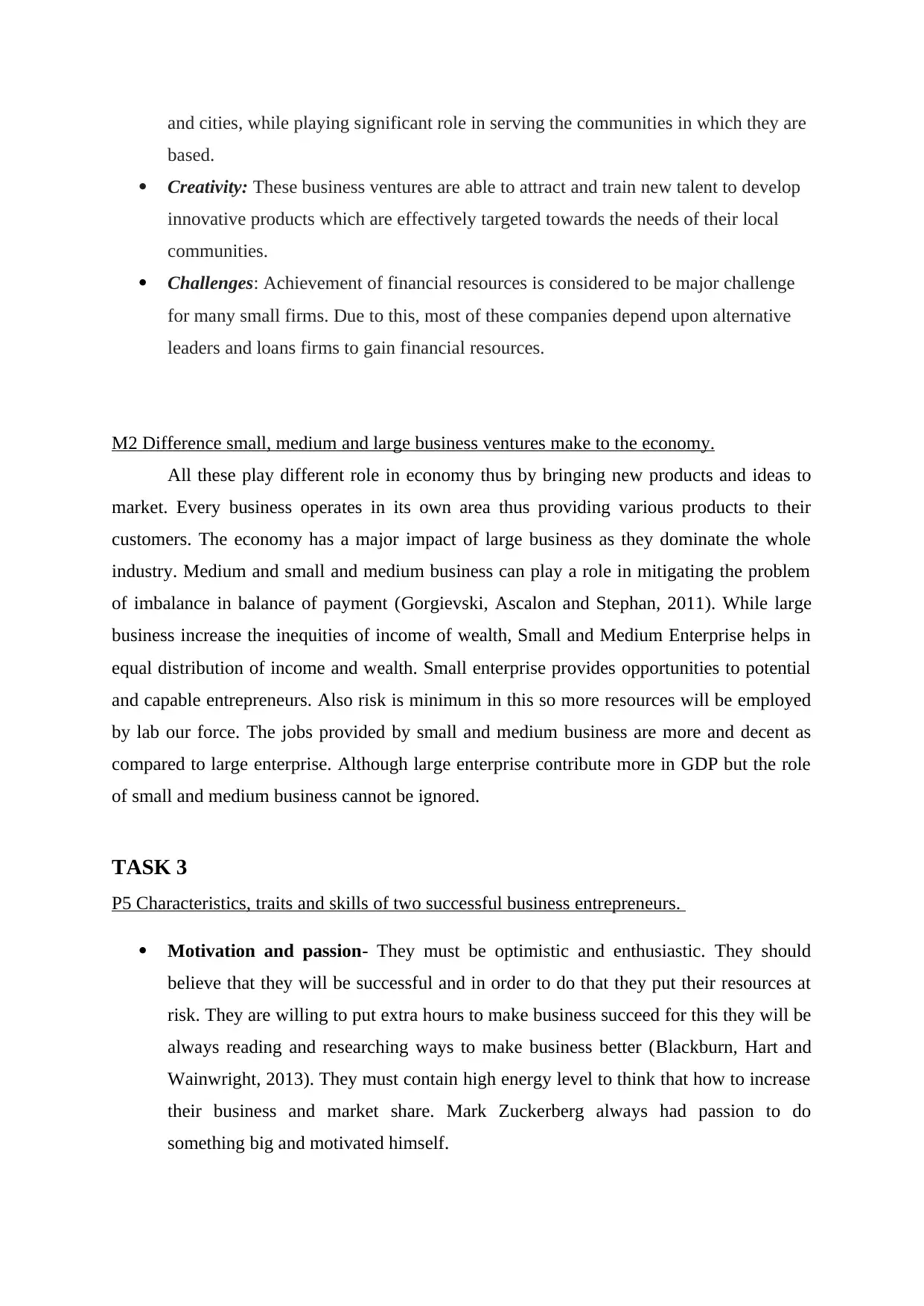
and cities, while playing significant role in serving the communities in which they are
based.
Creativity: These business ventures are able to attract and train new talent to develop
innovative products which are effectively targeted towards the needs of their local
communities.
Challenges: Achievement of financial resources is considered to be major challenge
for many small firms. Due to this, most of these companies depend upon alternative
leaders and loans firms to gain financial resources.
M2 Difference small, medium and large business ventures make to the economy.
All these play different role in economy thus by bringing new products and ideas to
market. Every business operates in its own area thus providing various products to their
customers. The economy has a major impact of large business as they dominate the whole
industry. Medium and small and medium business can play a role in mitigating the problem
of imbalance in balance of payment (Gorgievski, Ascalon and Stephan, 2011). While large
business increase the inequities of income of wealth, Small and Medium Enterprise helps in
equal distribution of income and wealth. Small enterprise provides opportunities to potential
and capable entrepreneurs. Also risk is minimum in this so more resources will be employed
by lab our force. The jobs provided by small and medium business are more and decent as
compared to large enterprise. Although large enterprise contribute more in GDP but the role
of small and medium business cannot be ignored.
TASK 3
P5 Characteristics, traits and skills of two successful business entrepreneurs.
Motivation and passion- They must be optimistic and enthusiastic. They should
believe that they will be successful and in order to do that they put their resources at
risk. They are willing to put extra hours to make business succeed for this they will be
always reading and researching ways to make business better (Blackburn, Hart and
Wainwright, 2013). They must contain high energy level to think that how to increase
their business and market share. Mark Zuckerberg always had passion to do
something big and motivated himself.
based.
Creativity: These business ventures are able to attract and train new talent to develop
innovative products which are effectively targeted towards the needs of their local
communities.
Challenges: Achievement of financial resources is considered to be major challenge
for many small firms. Due to this, most of these companies depend upon alternative
leaders and loans firms to gain financial resources.
M2 Difference small, medium and large business ventures make to the economy.
All these play different role in economy thus by bringing new products and ideas to
market. Every business operates in its own area thus providing various products to their
customers. The economy has a major impact of large business as they dominate the whole
industry. Medium and small and medium business can play a role in mitigating the problem
of imbalance in balance of payment (Gorgievski, Ascalon and Stephan, 2011). While large
business increase the inequities of income of wealth, Small and Medium Enterprise helps in
equal distribution of income and wealth. Small enterprise provides opportunities to potential
and capable entrepreneurs. Also risk is minimum in this so more resources will be employed
by lab our force. The jobs provided by small and medium business are more and decent as
compared to large enterprise. Although large enterprise contribute more in GDP but the role
of small and medium business cannot be ignored.
TASK 3
P5 Characteristics, traits and skills of two successful business entrepreneurs.
Motivation and passion- They must be optimistic and enthusiastic. They should
believe that they will be successful and in order to do that they put their resources at
risk. They are willing to put extra hours to make business succeed for this they will be
always reading and researching ways to make business better (Blackburn, Hart and
Wainwright, 2013). They must contain high energy level to think that how to increase
their business and market share. Mark Zuckerberg always had passion to do
something big and motivated himself.
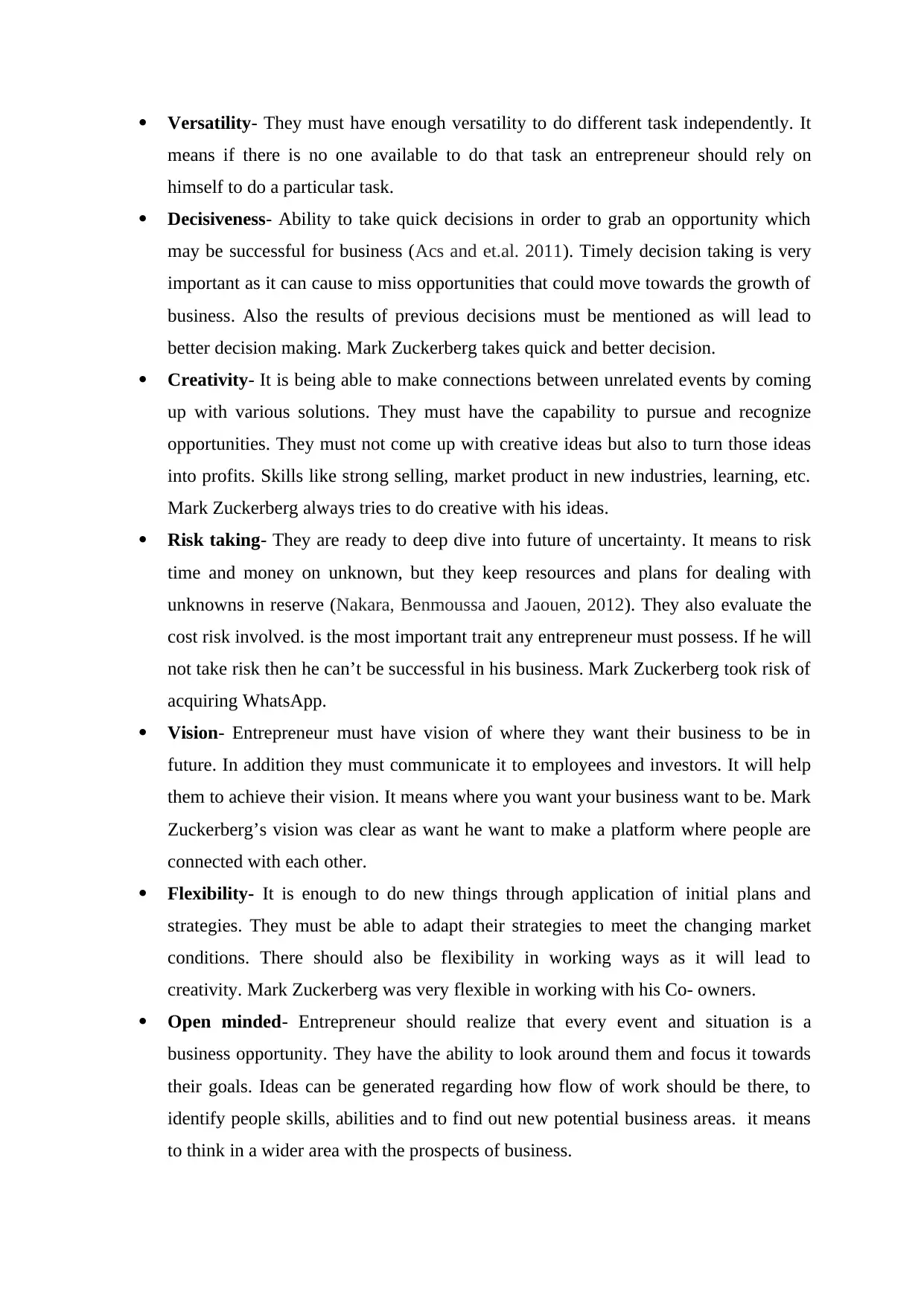
Versatility- They must have enough versatility to do different task independently. It
means if there is no one available to do that task an entrepreneur should rely on
himself to do a particular task.
Decisiveness- Ability to take quick decisions in order to grab an opportunity which
may be successful for business (Acs and et.al. 2011). Timely decision taking is very
important as it can cause to miss opportunities that could move towards the growth of
business. Also the results of previous decisions must be mentioned as will lead to
better decision making. Mark Zuckerberg takes quick and better decision.
Creativity- It is being able to make connections between unrelated events by coming
up with various solutions. They must have the capability to pursue and recognize
opportunities. They must not come up with creative ideas but also to turn those ideas
into profits. Skills like strong selling, market product in new industries, learning, etc.
Mark Zuckerberg always tries to do creative with his ideas.
Risk taking- They are ready to deep dive into future of uncertainty. It means to risk
time and money on unknown, but they keep resources and plans for dealing with
unknowns in reserve (Nakara, Benmoussa and Jaouen, 2012). They also evaluate the
cost risk involved. is the most important trait any entrepreneur must possess. If he will
not take risk then he can’t be successful in his business. Mark Zuckerberg took risk of
acquiring WhatsApp.
Vision- Entrepreneur must have vision of where they want their business to be in
future. In addition they must communicate it to employees and investors. It will help
them to achieve their vision. It means where you want your business want to be. Mark
Zuckerberg’s vision was clear as want he want to make a platform where people are
connected with each other.
Flexibility- It is enough to do new things through application of initial plans and
strategies. They must be able to adapt their strategies to meet the changing market
conditions. There should also be flexibility in working ways as it will lead to
creativity. Mark Zuckerberg was very flexible in working with his Co- owners.
Open minded- Entrepreneur should realize that every event and situation is a
business opportunity. They have the ability to look around them and focus it towards
their goals. Ideas can be generated regarding how flow of work should be there, to
identify people skills, abilities and to find out new potential business areas. it means
to think in a wider area with the prospects of business.
means if there is no one available to do that task an entrepreneur should rely on
himself to do a particular task.
Decisiveness- Ability to take quick decisions in order to grab an opportunity which
may be successful for business (Acs and et.al. 2011). Timely decision taking is very
important as it can cause to miss opportunities that could move towards the growth of
business. Also the results of previous decisions must be mentioned as will lead to
better decision making. Mark Zuckerberg takes quick and better decision.
Creativity- It is being able to make connections between unrelated events by coming
up with various solutions. They must have the capability to pursue and recognize
opportunities. They must not come up with creative ideas but also to turn those ideas
into profits. Skills like strong selling, market product in new industries, learning, etc.
Mark Zuckerberg always tries to do creative with his ideas.
Risk taking- They are ready to deep dive into future of uncertainty. It means to risk
time and money on unknown, but they keep resources and plans for dealing with
unknowns in reserve (Nakara, Benmoussa and Jaouen, 2012). They also evaluate the
cost risk involved. is the most important trait any entrepreneur must possess. If he will
not take risk then he can’t be successful in his business. Mark Zuckerberg took risk of
acquiring WhatsApp.
Vision- Entrepreneur must have vision of where they want their business to be in
future. In addition they must communicate it to employees and investors. It will help
them to achieve their vision. It means where you want your business want to be. Mark
Zuckerberg’s vision was clear as want he want to make a platform where people are
connected with each other.
Flexibility- It is enough to do new things through application of initial plans and
strategies. They must be able to adapt their strategies to meet the changing market
conditions. There should also be flexibility in working ways as it will lead to
creativity. Mark Zuckerberg was very flexible in working with his Co- owners.
Open minded- Entrepreneur should realize that every event and situation is a
business opportunity. They have the ability to look around them and focus it towards
their goals. Ideas can be generated regarding how flow of work should be there, to
identify people skills, abilities and to find out new potential business areas. it means
to think in a wider area with the prospects of business.
⊘ This is a preview!⊘
Do you want full access?
Subscribe today to unlock all pages.

Trusted by 1+ million students worldwide
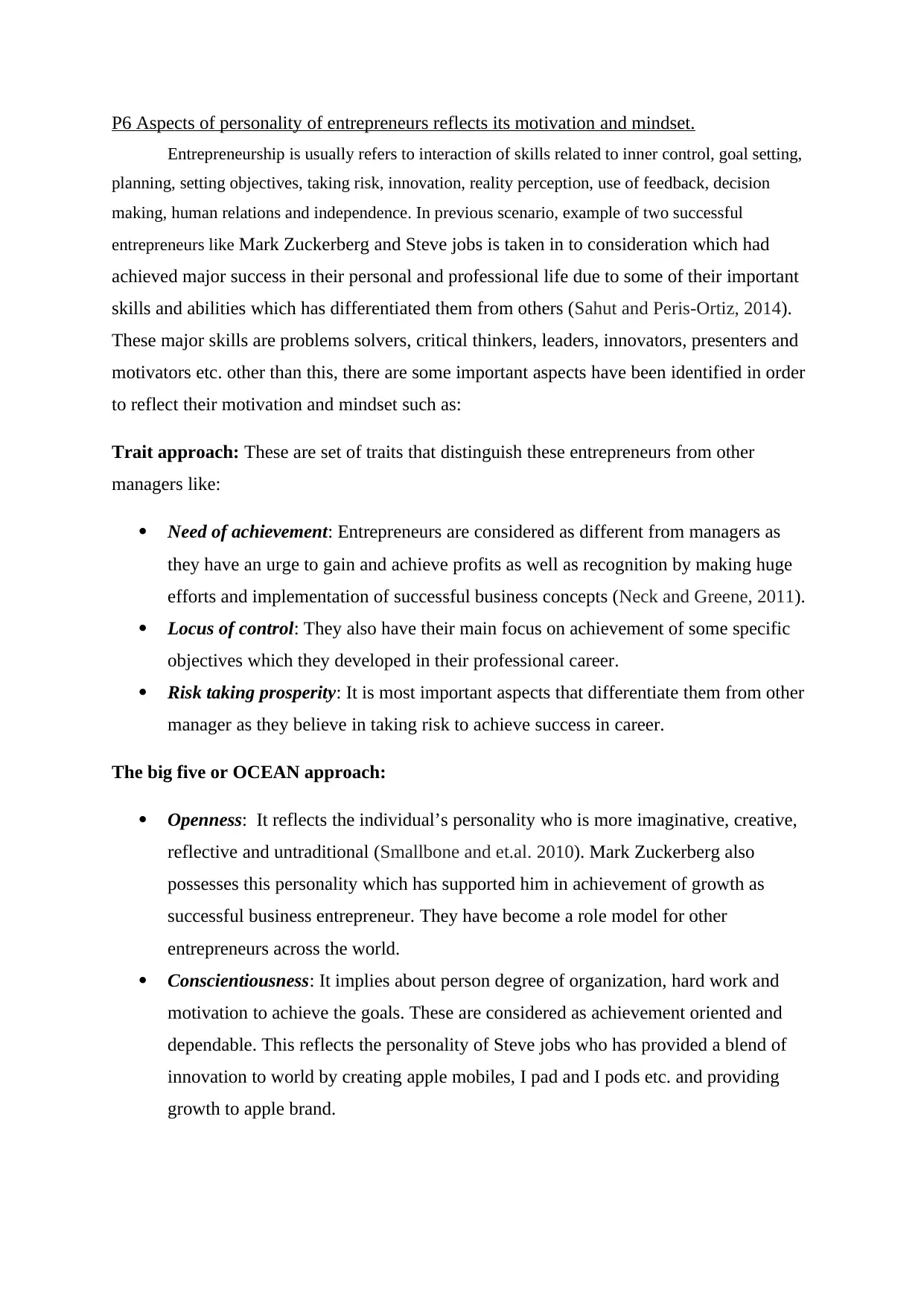
P6 Aspects of personality of entrepreneurs reflects its motivation and mindset.
Entrepreneurship is usually refers to interaction of skills related to inner control, goal setting,
planning, setting objectives, taking risk, innovation, reality perception, use of feedback, decision
making, human relations and independence. In previous scenario, example of two successful
entrepreneurs like Mark Zuckerberg and Steve jobs is taken in to consideration which had
achieved major success in their personal and professional life due to some of their important
skills and abilities which has differentiated them from others (Sahut and Peris-Ortiz, 2014).
These major skills are problems solvers, critical thinkers, leaders, innovators, presenters and
motivators etc. other than this, there are some important aspects have been identified in order
to reflect their motivation and mindset such as:
Trait approach: These are set of traits that distinguish these entrepreneurs from other
managers like:
Need of achievement: Entrepreneurs are considered as different from managers as
they have an urge to gain and achieve profits as well as recognition by making huge
efforts and implementation of successful business concepts (Neck and Greene, 2011).
Locus of control: They also have their main focus on achievement of some specific
objectives which they developed in their professional career.
Risk taking prosperity: It is most important aspects that differentiate them from other
manager as they believe in taking risk to achieve success in career.
The big five or OCEAN approach:
Openness: It reflects the individual’s personality who is more imaginative, creative,
reflective and untraditional (Smallbone and et.al. 2010). Mark Zuckerberg also
possesses this personality which has supported him in achievement of growth as
successful business entrepreneur. They have become a role model for other
entrepreneurs across the world.
Conscientiousness: It implies about person degree of organization, hard work and
motivation to achieve the goals. These are considered as achievement oriented and
dependable. This reflects the personality of Steve jobs who has provided a blend of
innovation to world by creating apple mobiles, I pad and I pods etc. and providing
growth to apple brand.
Entrepreneurship is usually refers to interaction of skills related to inner control, goal setting,
planning, setting objectives, taking risk, innovation, reality perception, use of feedback, decision
making, human relations and independence. In previous scenario, example of two successful
entrepreneurs like Mark Zuckerberg and Steve jobs is taken in to consideration which had
achieved major success in their personal and professional life due to some of their important
skills and abilities which has differentiated them from others (Sahut and Peris-Ortiz, 2014).
These major skills are problems solvers, critical thinkers, leaders, innovators, presenters and
motivators etc. other than this, there are some important aspects have been identified in order
to reflect their motivation and mindset such as:
Trait approach: These are set of traits that distinguish these entrepreneurs from other
managers like:
Need of achievement: Entrepreneurs are considered as different from managers as
they have an urge to gain and achieve profits as well as recognition by making huge
efforts and implementation of successful business concepts (Neck and Greene, 2011).
Locus of control: They also have their main focus on achievement of some specific
objectives which they developed in their professional career.
Risk taking prosperity: It is most important aspects that differentiate them from other
manager as they believe in taking risk to achieve success in career.
The big five or OCEAN approach:
Openness: It reflects the individual’s personality who is more imaginative, creative,
reflective and untraditional (Smallbone and et.al. 2010). Mark Zuckerberg also
possesses this personality which has supported him in achievement of growth as
successful business entrepreneur. They have become a role model for other
entrepreneurs across the world.
Conscientiousness: It implies about person degree of organization, hard work and
motivation to achieve the goals. These are considered as achievement oriented and
dependable. This reflects the personality of Steve jobs who has provided a blend of
innovation to world by creating apple mobiles, I pad and I pods etc. and providing
growth to apple brand.
Paraphrase This Document
Need a fresh take? Get an instant paraphrase of this document with our AI Paraphraser

(Source: Five-Factor Model of Personality, 2017)
Figure 2 OCEAN model of personality test
Extraversion: Individuals with this personality traits used tends to enjoy human
interactions and considered as enthusiastic, talkative and gregarious.
Agreeableness: Persons who are high on this trait usually trust, forgive, care and
cooperate with others and those who are low considered as manipulative, self-
centered and ruthless etc. Both the entrepreneurs have high agreeableness which has
supported them to overcome their weaknesses and create motivation.
Neuroticism: Usually individuals are high on this this traits that experience negative
emotions like anxiety, hostility, depression, vulnerability and impulsiveness (Five-
Factor Model of Personality, 2017). Entrepreneurs low with these traits are
considered as emotionally stable and are analyzed as self-confident, positive and
relaxed. This clearly reflects the personality of Steve jobs who have various
challenges but provided positive response and dedication to achieve the objectives.
Thus, these are some important aspects that reflect the personality of entrepreneurs.
M3 Argument related to characteristics of entrepreneurs
In order to achieve success in business operations, there are some important
characteristics are required in individuals so that it will be able to accomplish the work
effectively. It encourages individuals to generate unique and creative ideas through which it
Figure 2 OCEAN model of personality test
Extraversion: Individuals with this personality traits used tends to enjoy human
interactions and considered as enthusiastic, talkative and gregarious.
Agreeableness: Persons who are high on this trait usually trust, forgive, care and
cooperate with others and those who are low considered as manipulative, self-
centered and ruthless etc. Both the entrepreneurs have high agreeableness which has
supported them to overcome their weaknesses and create motivation.
Neuroticism: Usually individuals are high on this this traits that experience negative
emotions like anxiety, hostility, depression, vulnerability and impulsiveness (Five-
Factor Model of Personality, 2017). Entrepreneurs low with these traits are
considered as emotionally stable and are analyzed as self-confident, positive and
relaxed. This clearly reflects the personality of Steve jobs who have various
challenges but provided positive response and dedication to achieve the objectives.
Thus, these are some important aspects that reflect the personality of entrepreneurs.
M3 Argument related to characteristics of entrepreneurs
In order to achieve success in business operations, there are some important
characteristics are required in individuals so that it will be able to accomplish the work
effectively. It encourages individuals to generate unique and creative ideas through which it
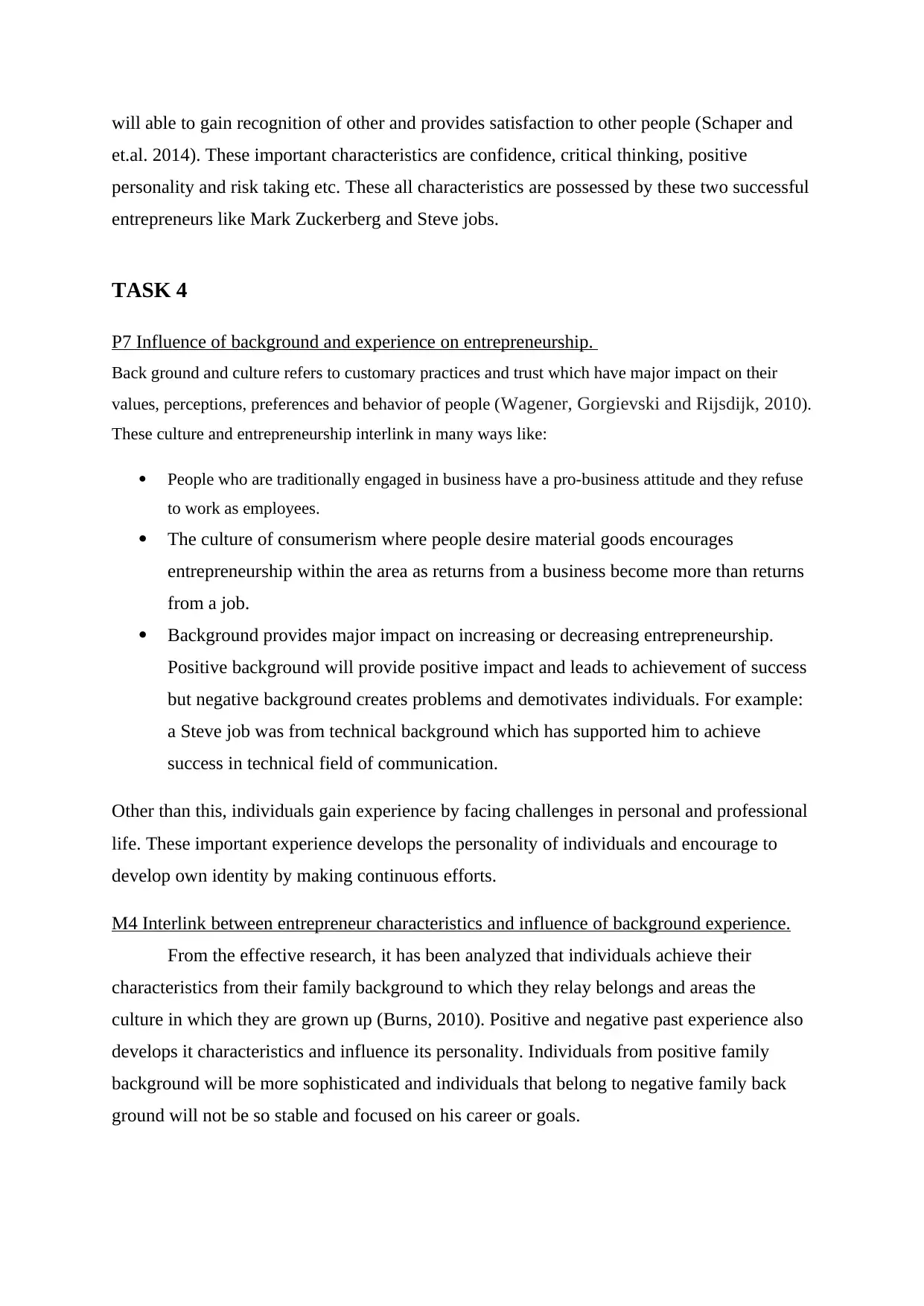
will able to gain recognition of other and provides satisfaction to other people (Schaper and
et.al. 2014). These important characteristics are confidence, critical thinking, positive
personality and risk taking etc. These all characteristics are possessed by these two successful
entrepreneurs like Mark Zuckerberg and Steve jobs.
TASK 4
P7 Influence of background and experience on entrepreneurship.
Back ground and culture refers to customary practices and trust which have major impact on their
values, perceptions, preferences and behavior of people (Wagener, Gorgievski and Rijsdijk, 2010).
These culture and entrepreneurship interlink in many ways like:
People who are traditionally engaged in business have a pro-business attitude and they refuse
to work as employees.
The culture of consumerism where people desire material goods encourages
entrepreneurship within the area as returns from a business become more than returns
from a job.
Background provides major impact on increasing or decreasing entrepreneurship.
Positive background will provide positive impact and leads to achievement of success
but negative background creates problems and demotivates individuals. For example:
a Steve job was from technical background which has supported him to achieve
success in technical field of communication.
Other than this, individuals gain experience by facing challenges in personal and professional
life. These important experience develops the personality of individuals and encourage to
develop own identity by making continuous efforts.
M4 Interlink between entrepreneur characteristics and influence of background experience.
From the effective research, it has been analyzed that individuals achieve their
characteristics from their family background to which they relay belongs and areas the
culture in which they are grown up (Burns, 2010). Positive and negative past experience also
develops it characteristics and influence its personality. Individuals from positive family
background will be more sophisticated and individuals that belong to negative family back
ground will not be so stable and focused on his career or goals.
et.al. 2014). These important characteristics are confidence, critical thinking, positive
personality and risk taking etc. These all characteristics are possessed by these two successful
entrepreneurs like Mark Zuckerberg and Steve jobs.
TASK 4
P7 Influence of background and experience on entrepreneurship.
Back ground and culture refers to customary practices and trust which have major impact on their
values, perceptions, preferences and behavior of people (Wagener, Gorgievski and Rijsdijk, 2010).
These culture and entrepreneurship interlink in many ways like:
People who are traditionally engaged in business have a pro-business attitude and they refuse
to work as employees.
The culture of consumerism where people desire material goods encourages
entrepreneurship within the area as returns from a business become more than returns
from a job.
Background provides major impact on increasing or decreasing entrepreneurship.
Positive background will provide positive impact and leads to achievement of success
but negative background creates problems and demotivates individuals. For example:
a Steve job was from technical background which has supported him to achieve
success in technical field of communication.
Other than this, individuals gain experience by facing challenges in personal and professional
life. These important experience develops the personality of individuals and encourage to
develop own identity by making continuous efforts.
M4 Interlink between entrepreneur characteristics and influence of background experience.
From the effective research, it has been analyzed that individuals achieve their
characteristics from their family background to which they relay belongs and areas the
culture in which they are grown up (Burns, 2010). Positive and negative past experience also
develops it characteristics and influence its personality. Individuals from positive family
background will be more sophisticated and individuals that belong to negative family back
ground will not be so stable and focused on his career or goals.
⊘ This is a preview!⊘
Do you want full access?
Subscribe today to unlock all pages.

Trusted by 1+ million students worldwide
1 out of 15
Related Documents
Your All-in-One AI-Powered Toolkit for Academic Success.
+13062052269
info@desklib.com
Available 24*7 on WhatsApp / Email
![[object Object]](/_next/static/media/star-bottom.7253800d.svg)
Unlock your academic potential
Copyright © 2020–2026 A2Z Services. All Rights Reserved. Developed and managed by ZUCOL.




